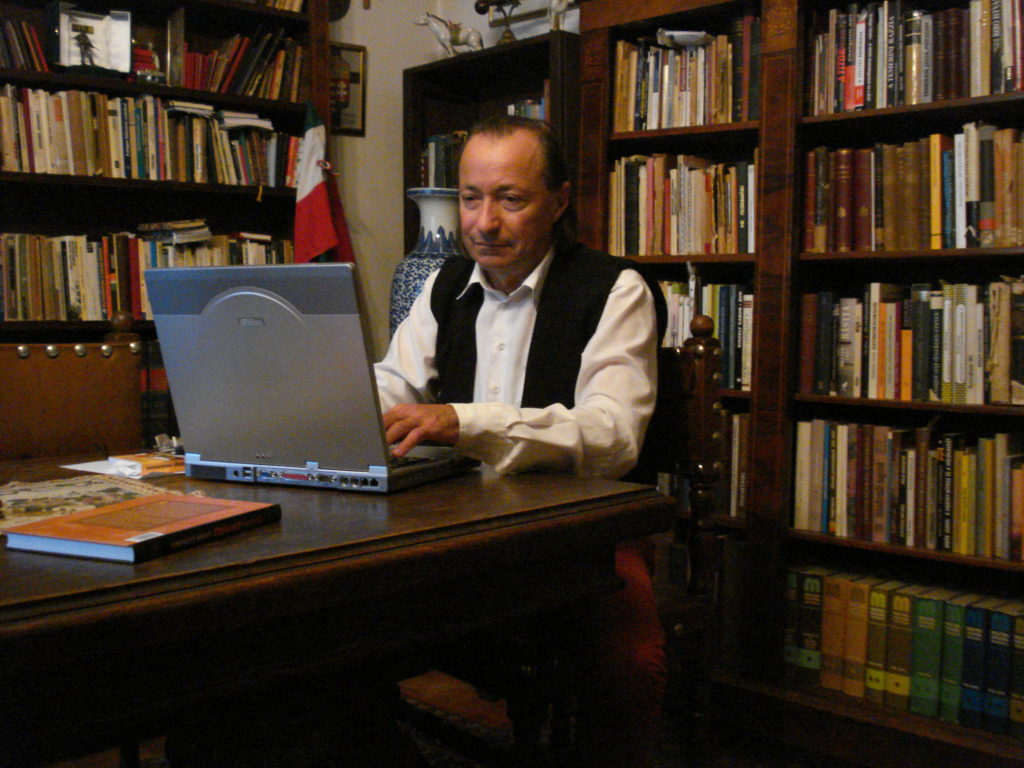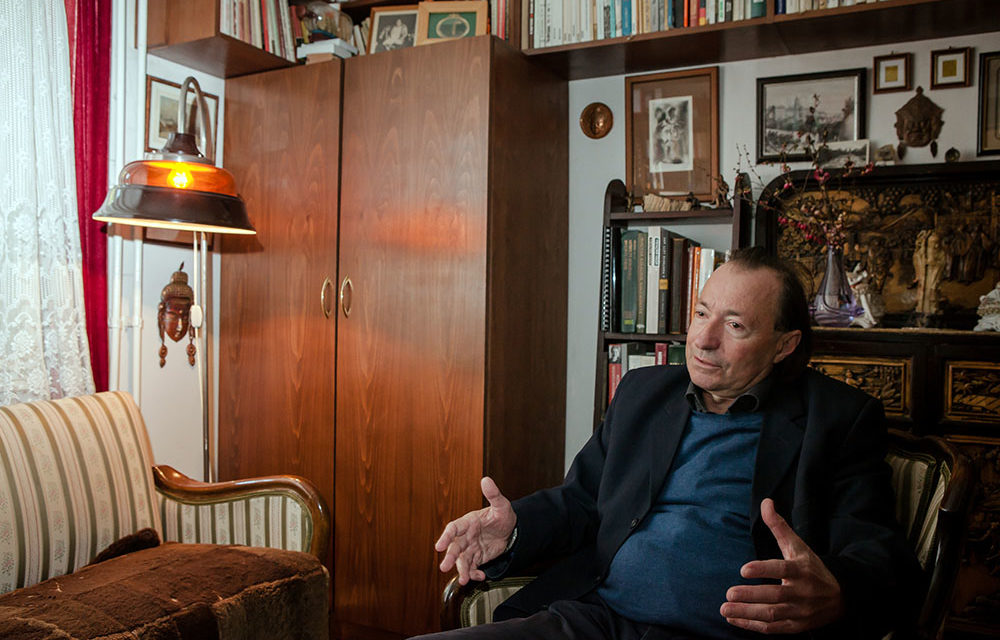March 15 is a symbol of a process, a turning point, which contemporaries experienced with extreme emotions. Living brilliantly, the experience of liberation, development, the feeling of the mission of the found greatness mixed in almost everyone with the possibility of fatal fall and destruction. "Are we lost for a moment? Or will someone stay?” On the occasion of the national holiday, we talked with historian Károly Szerencsés.
In a previous conversation, you said that history is a process that is not preordained, and a historian can never reconstruct what happened at a given moment, at most certain elements. Therefore, the connections must be explored, and within them there may be symbolic moments that can be used to show how the world has turned. Was March 15, 1848 such a moment in Hungarian history?
March 15 is a symbol of a process, a turning point, which contemporaries experienced with extreme emotions. Living brilliantly, the experience of liberation, development, the feeling of the mission of the found greatness mixed in almost everyone with the possibility of fatal fall and destruction. "Are we lost for a moment? Or will someone stay?” The day itself, March 15, was also important, because it carried within itself the two main driving forces of the will of the Hungarians freed from Turkish rule and re-educated in a century and a half: nation and freedom. However, March 15 only became a sign and a symbol long after the events. It meant the same thing in terms of oppression and liberation: the national unity of Hungarians and the almost superstitious identification of this nation with freedom. And it meant, it means the many trials and tribulations, but it also means the defiant mission, the faith in success, without which this day and the freedom struggle of 1848-49 would be just a dramatic episode in our history, not a source of nourishment for the soul. , spirit, self-esteem, future. The events of March 15 in Pest are significant in themselves, above all through the creation of a free press.
Can this day be called a romantic moment?
Yes, the nineteenth century, receptive to revolutionary solutions, also demanded romantic moments, which were matured into legends by contemporaries and then by posterity. This revolutionary romanticism was tried to be used later - for example by the communists - but this tradition proved to be very resistant. Precisely because of its two main pillars, the nation and freedom, which the communists had little to do with. Even poor Petőfi would have been demoted to the first Hungarian communist. In fact! During the Kádár dictatorship, students protesting at the Petőfi statue were beaten over the head by the poem "Petőfi's Wreaths" by Mihály Babits. Then the blood flowed. It was recorded: "The comrades involved in the action carried out their task with enthusiasm."
But on March 15, 1848, no blood was shed.
No, not yet. Important matters were decided in Vienna and Bratislava, where the Parliament met. Of course, Petőfi wrote something like, "There may have been blood, but do you want to transform without bloodshed? God help me, but nothing will come of it." He also wrote about the hanging of kings, he was a republican and a priest-eater. But he also wrote that "The main watchword of the republic is not down with the kings, but pure morality." Then there was a lot of blood, a lot. And Endre Ady could describe it: "However, a soldierless Világos and an unarmed Arad can destroy this nation for half a thousand years or forever." Vílagos was preceded by the final military effort of a nation, Arad had plenty of bits and bullets. This much blood is also red in the national tricolor.

Photo: From the collection of Károly Szerencsés
What do the process leading up to March 15, the struggles of the 18 years before 1848, tell the people of today?
On March 15, we celebrate the entire great national renewal and political program that prepared and then won the legal, political, moral, and economic foundations of modern bourgeois Hungary. At the same time, it made it possible for all the people living in the Carpathian basin to prosper based on the legal equality expected in the era. In fact! The Hungarian nobility and intellectuals who led this struggle - this term can still be used here - tried to win the rights that were evident to them for all the people of the Habsburg empire. The message is very relevant: we can only move forward together, helping each other, and we must not listen to any sirens. At that time, the Labans and the nationalities, led by the cherished Croats, accepted Serbs and Romanians, whistled from Vienna and jumped to their feet. They pulled a dagger on messy, dirty promises and stabbed the Hungarian in the back. Of course, they could not have won, just like the "Austrians". Two hundred thousand Russians were also needed for that. This is also the message of March 15. And if I have already quoted Ady, let the words of István Tisza also stand here: "because the manly struggle of every nation, even if it costs the blood of hundreds of thousands, can be a warm bed for a good, a more beautiful future."
The reform movement at that time was about public responsibility, perpetual suffrage, freedom of the press, and the creation of a responsible Hungarian ministry, but today's reformers demand a rainbow family and call for more and more genders. Can we say that currently the revolutionary is the one who stands up for traditional values and understands that the constitutional fixation of the clause "the father is a man and the mother is a woman" is not an action, but a reaction on the part of the Hungarian government?
I value István Széchenyi, Lajos Batthyány, Sándor Petőfi, Lajos Kossuth, József Eötvös and all those who participated in the creation of modern bourgeois Hungary. I read the poems of Mihály Vörösmarty, János Arany, and Mihály Tompa every day. Mór Jókai's novels. The diaries. I can only recommend. Many people, including our first responsible Prime Minister Lajos Batthyány, the generals and officers of Arad paid with their lives for freedom. The protagonists judged the events differently according to their temperament. It is enough to refer to the contrast between Széchenyi and Kossuth. The former writes: "I brought light to our institutions... Batthyány and Kossuth covered them in fire." And then what can we say about Petőfi's emotions and visions? "Terrible time, terrible time!/And the terribleness grows all the time." Standing up for value is our only meaningful option. We will always have this right. Maybe our tradition, our taste, our language, our dance will become a revolutionary need. The basic biological problems of the mentioned "reforms" have existed as long as humans have lived on Earth, but it has only recently become a political program, but I don't think that these fraudulent machinations should be mentioned on the same page as the message of March 15.
Due to the epidemic, Prime Minister Viktor Orbán was last able to hold a public commemoration on the national holiday in 2019, where he said, among other things, that "we will all lose our freedom in a liberal European empire". In 1848, secession from an empire would have meant freedom, but today there are those who see it as joining another empire, or rather pretend to see it. What does freedom really mean?
An empire is always based on violence, central rule. Through it, freedom and the nation are always damaged or even destroyed, and since it is based on violence, so is morality. Even if it creates a specific "imperial morality". It can be a fellow citizen (French Revolution), a fellow citizen (National Socialist Revolution), a comrade (Communist Revolution). Petőfi was enthusiastic about the fellow citizen, we will leave the rest. Is such a new imperial morality already in the making? It is only called "politically correct", but this already has a relationship with religion, nation, gender, taste, and above all, with freedom. Together, these can almost express morality. Beware of empires, if only because we can only be the province of any of them. In 1848, however, according to Hungarian ideas, it was about turning the Central European empire, which was marked by the name of the Habsburgs, into a viable state structure that would work for the benefit of the nations living here. This seemed like a very good idea, and its intellectual and political initiator was the Hungarians. However, neither Vienna nor some nationalities were receptive. But since the Hungarians proved to be strong enough at the time, and still are, in 1867 they forced the establishment of the dualistic Austro-Hungarian state. It was also an empire. It failed, despite how democratic it started - and could have been if it had been allowed to develop - compared to what was later realized in the region.
"The Highness of the Viceroy's Council was pale and shivering, and after five minutes of deliberation, he agreed to everything." Petőfi wrote this on March 15, after the 20,000-strong crowd marched to Buda, to the governor's council and presented their wishes. Today, we do not see trembling Brussels officials after street demonstrations, mass movements, or even after acts of terrorism. Where is Europe and the European Union headed?
I believe Petőfi that it all happened this way, but before that, one and another happened in Vienna and Bratislava at the same time. The point was that the "Izenet" that had matured over the years passed in the Parliament. This "Izenet" - Széchenyi's word - included the responsible Hungarian ministry and all the transformations that created the civil legal order and asserted Hungary's independence within the empire. It is certain that no poem has ever had such an impact as Petőfi's poem: "Glorious gentlemen, how are you?/Does your neck itch a little?" But neither a crowd, nor a poem, nor an izenet (inscription proposal) is enough if it does not support that popular will. If the zeitgeist is not there, if the people - scientists, poets, carpenters, peasants, soldiers, women and girls, young and old - do not feel that the time has come! In my place, the poem is sung, the song is sung, the politician is speaking, this is what we want, this is how we are a modern nation. This happened in 1848, and we still live on it today.

Photo: From the collection of Károly Szerencsés
Meanwhile, we experienced a '56.
Yes, then a new, even bolder, more self-sacrificing youth really came. However, it cannot be said how different times we live today. The tools of manipulation are so sophisticated that I really only want to see a crowd on the street if it remembers and celebrates, if it sings and dances cheerfully. I'm not naive. But he's not blind either. I believe in the future of our nation, despite the proliferation of globalism, I believe in the sobriety of the youth, despite all the hype. There is a need for rebellion, there is a need for peaceful patriotism. The new generations need to know and will know when it is appropriate.
Will we have enough mental strength?
Be! But let's make sure that the legal, fraud-free tools remain for the expression of the will of the people! The most important task of every democrat is to ensure this in the European Union. If you don't have a shirt, don't wear one, but we won't tolerate cheating anymore. Because then you have to go! Not to pull away, take offense, emigrate, run away, but as Lajos Kossuth said. To stand up for freedom with an organized spirit: this is our job. It was never easy, we trembled many times, and this resulted in suicide. It is strong against it, but these days we imagine its power to be more than it really is. With Mihály Tompa, the truth is: "Be silent, you of little faith, / Crows of ominous grief!"













